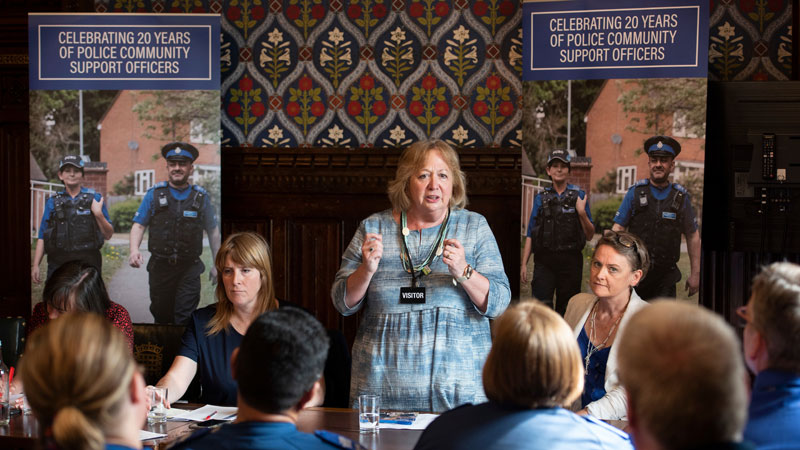UNISON yesterday launched its celebration marking the 20th anniversary of the creation of the police community support officer (PCSO), with a major event in Parliament.
Senior Labour politicians joined UNISON general secretary Christina McAnea and six PCSO members from England and Wales, to speak of the value and importance of the role and the urgent need for the UK government to finance new recruitment.
Speaking to the PCSOs in the room, Ms McAnea said: “This is a success story. This is something that has worked. You’re not an add-on, you’re integral to the way that we police in this country.”
And shadow home secretary Yvette Cooper told them: “The work you do every single day of the week is so incredibly important – keeping communities safe, building communities’ strength and resilience… We owe you so much.”
The Police Reform Act introduced the role of PCSO on 24 July 2002. The Metropolitan Police in London created the first PCSOs the same year, with other forces quickly following.
Rooted in local areas, PCSOs provide a highly visible police presence. They deter anti-social behaviour, provide reassurance, gather intelligence and work with businesses, schools and others to keep communities safe.
PCSOs work in all forces in England and Wales, but not for Police Scotland or the Police Service of Northern Ireland. Unlike police officers, PCSOs can join a trade union – and nearly 70% of them are UNISON members.

Christina McAnea in Parliament
The Welsh Government has actively supported the PCSO workforce in its four forces, with funding for an additional 600 PCSOs in the past decade.
In stark contrast, UK government cuts have led to a 45% drop in PCSOs numbers in England since 2010.
UNISON’s anniversary work is two-fold: celebration and campaign.
The union is vigorously campaigning for an additional 7,600 PCSOs to be recruited, in England, to replace those lost jobs. Ben Priestley, the national officer for police and justice, has written to key police stakeholders, including the home secretary, National Police Chiefs Council, Association of Police and Crime Commissioners, College of Policing, Her Majesty’s Inspectorate of Constabulary and others, urging their support to rebuild the PCSO workforce.
The union is also asking branches to publicise the great work of their PCSO members, and to reach out to MPs and Senedd (Welsh Parliament) members, inviting them to visit their local police forces and learn more about the role.
It is providing branches with celebration materials, and sending a special commemorative booklet to every PCSO, as well as to MPs in England.

Shadow home secretary Yvette Cooper
Those attending the event in Parliament included David Blunkett, who as home secretary oversaw the introduction of PCSOs 20 years ago, now sitting in the House of Lords; Jo Stevens, the shadow secretary for Wales; and Sarah Jones, shadow minister for policing.
UNISON’s PCSO members (main picture above, left to right) were: Chris Roberts (South Wales Police), Chris Moyes (Surrey), Matt Newman (Suffolk ), Tracey Burnett (Lincolnshire), Nad Ikram (Leicestershire) and Bronwen Newton (West Midlands).
Ms Stevens told the meeting: “I have brilliant PCSOs in my constituency in Cardiff Central. They are absolutely integral to our community. PCSOs are a really effective part of the policing family… they know everybody, they know the businesses, they know the schools, they know where the trouble is likely to happen.
“There’s just that connection and trust with PCSOs, because of that accessibility and that visibility, and it really, really makes a difference.
“The Welsh Labour government has not done the same as the government in England in terms of those savage cuts to numbers. There’s been a different approach, putting neighbourhood policing right at the heart of every community… That’s a political decision, because of the value and the benefit that you bring to our communities.”
In her speech, Ms McAnea praised the Labour Party “for having the courage to go ahead with this” 20 years ago, in the face of great scepticism and abuse, and she praised all PCSOs for having proved the naysayers wrong.
“To understand why PCSOs have been so successful, why they’re so important, the clue’s in the name – community support officers. You’re far more plugged into local communities, you’re more representative of your local communities, people are more trusting of you than they would be perhaps of others. And that relationship that’s built by PCSOs and their local communities and their police officers is invaluable.”
The general secretary said it was a “key campaign” to get those 7,600 jobs returned and “more community support officers on the streets.” And she added: “It’s so important that we continue to celebrate your job, the work that you do, and that we never let governments of any persuasion forget the impact that you have and the important role that you do.”
For her part, Ms Cooper suggested that a Labour government would not need too much convincing. She hailed the introduction of PCSOs as “hugely transformational” to British society, not least in reducing crime and tackling the growing problem of anti-social behaviour, adding that neighbourhood policing was fundamental to the British policing model, of “policing by consent”.
A Labour government has already set out proposals for ‘neighbourhood police hubs’ which would include prevention teams bringing police officers and PCSOs together with local council officers to deal with the prevention of crime and antisocial behaviour in communities.
And they already know how they plan to fund the new hubs – by cancelling the royal yacht.
“You have a royal yacht that neither the Navy nor the royal family want. It was one of Boris Johnson’s vanity projects. It should just be cancelled, and put that money into restoring the hubs into our communities and into championing neighbourhood policing.”
Images: Marcus Rose


